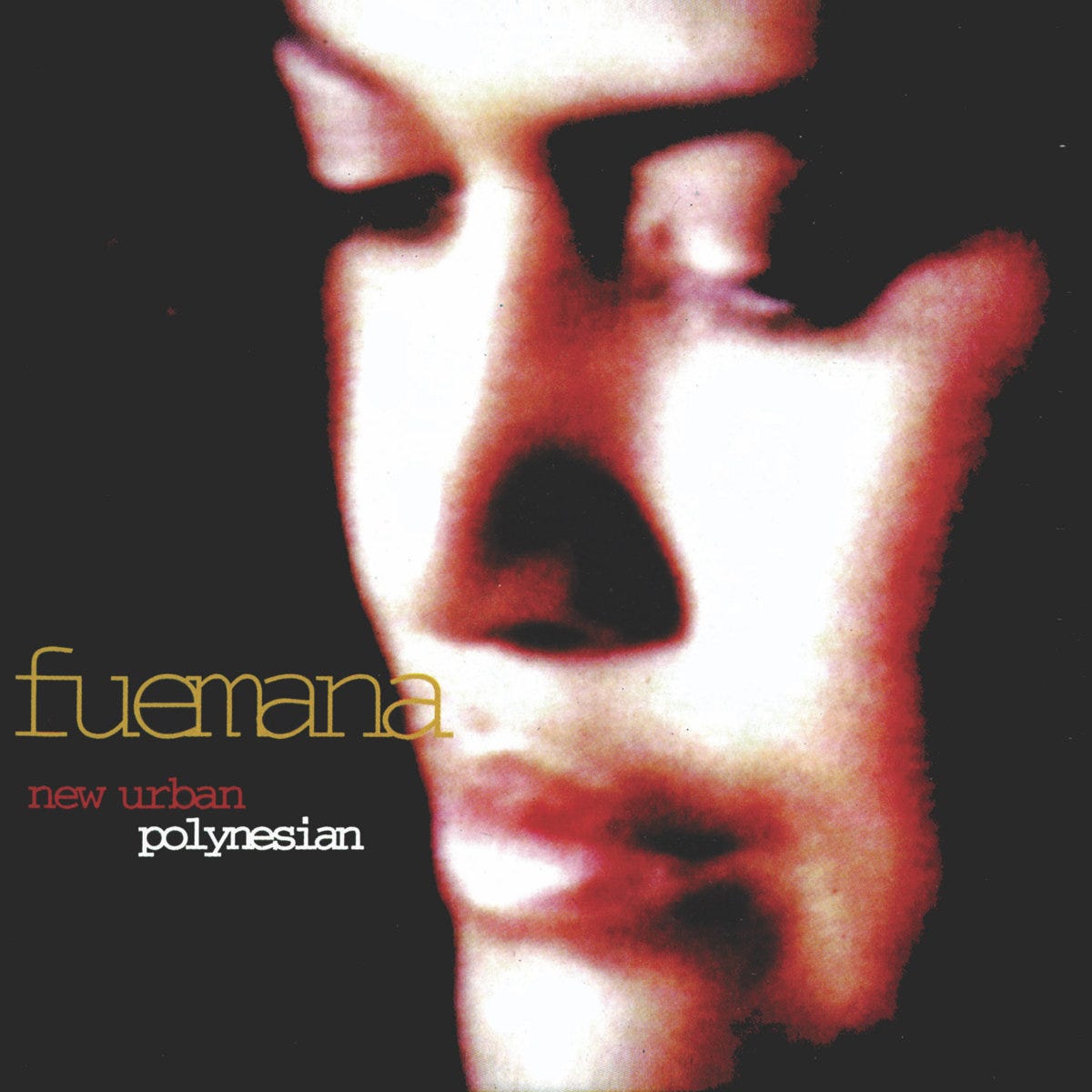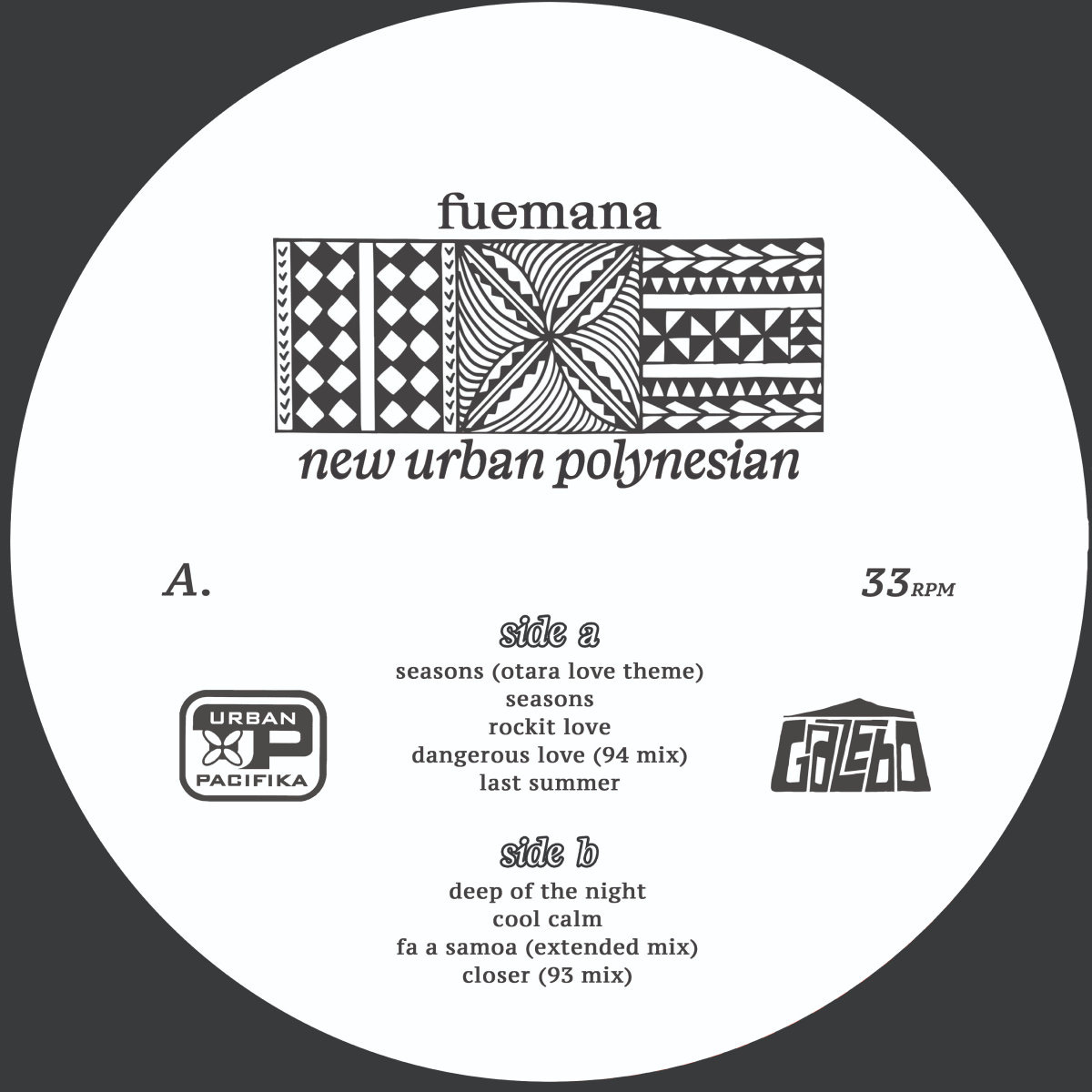Fuemana, New Urban Polynesian
The story of Fuemana's classic album, New Urban Polynesian
Selected Works is a weekly (usually) newsletter by the Te Whanganui-a-Tara, Aotearoa (Wellington, New Zealand) based freelance music journalist, broadcaster, copywriter and sometimes DJ Martyn Pepperell, aka Yours Truly. Most weeks, Selected Works consists of a recap of what I’ve been doing lately and some of what I’ve been listening to and reading, paired with film photographs I’ve taken + some bonuses. All of that said, sometimes it takes completely different forms.
Thirty years after it was released on CD and cassette, Fuemana’s cult classic New Urban Polynesian album will finally be available on vinyl from Friday the 29th of March, 2024. Born from the blood, sweat, and tears of the late great Polynesian Renaissance man Phil Fuemana and his family and friends, Fuemana’s music transports the listener back to the autumn and winter days of 1994 in the Antipodes, where they turned love, loss, grief, and acceptance into the finest R&B/street soul album ever recorded in Aotearoa New Zealand.
The oldest of four children born to a Niuean father and Mäori mother from Taranaki, Phil and his siblings, Tony, Christina and Pauly, grew up in Auckland in the 1970s/1980s. Raised in Parnell and Ōtara, they all felt a connection with music from a young age. Phil, in particular, deeply loved pop music, soft rock, and soul/R&B. He took to playing instruments and singing quickly before eventually writing songs and recording demos on cassette. “Phil used to sit us down in the lounge and play us music,” Christina remembered. “He’d show us what the R&B musicians wore and how they moved on stage. He’d even try to teach us dance moves.”
When he was 16, Phil dropped out of high school and began working menial jobs to help support the family. Things changed for him when he converted to Christianity and joined Youth For Christ’s Y-One music group. In 1984, Phil went on several national tours with Y-One and contributed bass and vocals to Play-On, a split album they recorded with Certain Sounds. Those experiences laid the foundations for everything that followed.
Several years later, Phil met a Pākehā (New Zealand European) singer named Matthew J. Ruys, aka Matty J. Bonding over Black American soul/R&B artists Alexander O'Neal and Luther Vandross, they teamed up with Phil’s siblings to form Houseparty. The group performed on the Christian music circuit and played at popular nightclubs of the era. “Phil’s biggest passion was where he was from,” said Matthew. We always used to nickname him the godfather of Ōtara because he wanted to bring up everyone around him. He wanted to help develop them and make those things happen, but then it spread, and people started coming to him from all over the place.”
In 1991, Houseparty released their debut single, ‘Dangerous Love,’ through Southside Records. Influenced by the global success of Soul II Soul and The Family Stand, they adopted a similar style, marrying Christina's exquisite, emotionally resonant vocal performance with a mid-tempo breakbeat, bubbly bass, and a rap from a high school maths teacher named Mark Hotu, who later retrained as a doctor, before sadly passing away in 2023. Simply put, the song was world-class. Picked up for DJ play by Norman Jay and Gilles Peterson, ‘Dangerous Love’ fit perfectly with the vibe sweeping through Europe that summer.
‘Dangerous Love’ was accompanied by a music video filmed at the Parnell railway station. “The view behind us showed our old home on Bradford Street on top of Grafton Road,” Christina said. Thinking back, Phil wanted to pay homage to where everything started for the family. Since they’d lived there, Parnell had become one of the most affluent suburbs in Auckland. Things had changed for Parnell, and they were also changing for the Fuemanas.
Later, Phil changed Houseparty’s name to Fuemana while working on Proud: An Urban Pacific Streetsoul Compilation, a landmark album and national tour that showcased the Pacific hip-hop, R&B and new jack swing sounds of South Auckland in 1994. As part of Proud, Phil produced and wrote for Otara Millionaires Club, a hip-hop group he shared with his brother Pauly and the rappers Ermehn and Paul Ave.
After Proud, Deepgrooves Entertainment offered Phil the opportunity to record and release an album. In an advert in Billboard magazine at the time, Deepgrooves positioned themselves as “The musical cross-pollination of cultures that comes from the world’s largest Polynesian city, Auckland,” making the label a perfect home for the mixture of R&B, street soul, sophisti-pop and house music Fuemana had been rehearsing at home, in the Manukau Christian City Church, and at the storied Ōtara Music Art Centre (OMAC).
Once Phil felt they were prepared, Fuemana spent several late nights tracking one-take sessions at The Lab Recording Studio with engineers Simon Taylor, Chris Sinclair and Mark Tierney. From there, New Urban Polynesian came together quickly. Across the album, Phil showed off his prodigious skills as a multi-instrumentalist and producer, playing most of the smooth, sophisticated, and heartfelt music himself. In the studio, he shared the lead with Christina and Matty J, supported by a cast of backing vocalists, musicians and guest vocalists, including a young Carly Binding, who would go on to find national fame a decade later in the TrueBliss pop group.
While they were recording, Phil had recently separated from his wife. Like his siblings, he was also still processing their father’s death five years earlier. As he began putting himself back together by transforming pain into catharsis through song, he approached New Urban Polynesian with a singular focus. From the lush openings of their soulful Roberta Flack, Donny Hathaway, and Stevie Wonder covers ‘Closer’ and ‘Rocket Love’ to the misty new jack swing serenade of his original ‘Seasons,’ Phil’s goal was to craft material that would let the music industry know the Fuemanas had arrived while also inspiring the next generation.
Despite having limited sales success, New Urban Polynesian was well-received by the local music community and reviewers. At the time, however, Christina and Tony were preoccupied with raising young families, and Matty was launching his solo career. With their priorities shifting, they mounted a final full-band performance in Māngere before winding things up.
In 1995, the Fuemana family’s youngest sibling, Pauly, borrowed the initials from Ōtara Millionaires Club and began performing as OMC. Not long after, he changed everything for New Zealand music by recording the feelgood guitar-laced Polynesian pop mega-hit ‘How Bizarre’ with producer Alan Jansson. Over the next two years, it became a global chart success, and Pauly toured the world with Tony and a backing band that included the jazz saxophonist Nathan Haines (who later found underground fame in the UK broken beat scene) and the legendary Auckland nightclub DJ Manuel Bundy. OMC released several more well-received singles and a full-length album along the way.
Consumed by a desire to do more musically, Phil established Urban Pacifika Records, where he launched the careers of a new wave of Pacific hip-hop and R&B talent, including Lost Tribe, Moizna, AKA Brown, and Sani Sagala, aka Dei Hamo. As a result of his influence, Lost Tribe member Danny Leaosavai'i, aka Brotha D, co-founded the legendary New Zealand Polynesian record label Dawn Raid Entertainment with Andy “YDNA” Murnane. Similarly, ten years after New Urban Polynesian, Dei Hamo became a Trans-Tasman sensation with his jiggy rap hit ‘We Gon Ride.’
“The main reason he got into music was to get our family out of poverty,” Tony explained. “Then he met a bunch of guys in the same situation as us, Dei Hamo, Brotha D and those guys. One of the defining things for him was when Frank Wilson from Motown came over to judge a talent quest. He said to Phil, ‘There is a lot of talent here, but it needs to be better.’ That was a defining thing for him, realising he was going to have to lift our game.”
In 2005, Phil tragically passed away from a heart attack aged 41. Five years later, Pauly, equally tragically, joined him after an extended battle with a rare neurological disorder, leaving Tony and Christina to grieve and make sense of their family’s extraordinary story.
Not long after Pauly’s death, the Auckland music archivist Peter McLennan became concerned about the quantity of 1990s New Zealand hip-hop and R&B that wasn’t available online. In response, he set up a YouTube channel and began digitising songs and videos. In 2012, Peter uploaded the videos for Fuemana’s version of ‘Rocket Love’ and ‘Seasons,’ gently introducing a new generation of music lovers around the world to New Urban Polynesian’s singular allure. “When I listen to the album now and hear how strong Phil, Christina, and Matty’s voices were, I remember how we were back then and what the album meant to us,” Tony reflected. “For me, it’s a taonga (a treasure) and a reflection of my pepeha (a way of introducing yourself). When I think about everything we’ve done since I can look back at that album and see how Phil planted the seed for all of us to do better.”
When New Urban Polynesian first hit record store shelves in 1994, the Fuemanas dedicated the album to their father, Takiula Fuemana. Three decades later, it has expanded in meaning to become a remembrance of their youngest brother Pauly and a celebration of the life and times of their big-hearted big brother, Mr. Fuemana, Mr. Phil Fuemana.
WHAT I’VE BEEN DOING:
Last week, I recorded another mix of late 2000s UK dubstep, purple, instrumental grime and various other bass sounds called Holographic City. You can stream it on Mixcloud here.
For Test Pressing, a few words on Time Capsule’s Tokyo Riddim 1976-1985, Nippon Acid Folk 1970-1980, and Nippon Psychedelic Soul 1970-1979 compilation albums. Read here.
The homies at BeeHype have put together a list of classic albums from around the world. Of course, I had to throw in my two cents from Aotearoa/New Zealand. Check it out here.
Audio Culture asked to syndicate my 2017 Look Blue Go Purple profile. I was happy to oblige, and I even went into my archives and added some additional material. Read here.
FIN.




